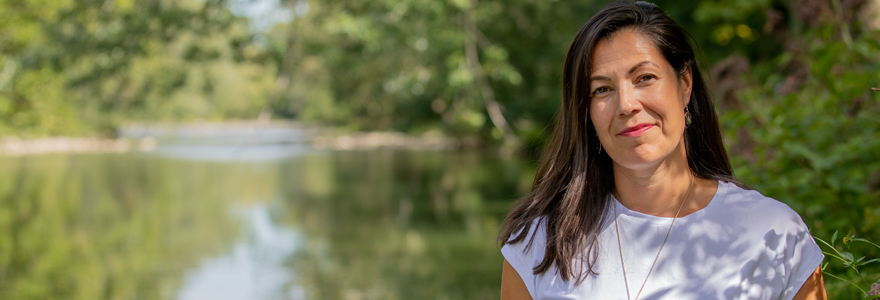News and Updates
Contact
Faculty of Social Science
Social Science Centre
Room 9438
Western University
T. 519-661-2053
F. 519-661-3868
E. social-science@uwo.ca
Chantelle Richmond awarded 2022 Fulbright Canada Research Chair in Social Sciences
September 21, 2022
Photo by Chris Kindratsky (Western Communications)/ Story by Rob Rombouts
When she travels to the University of Hawai’i at Mānoa (UH Mānoa) this December, Chantelle Richmond hopes to deepen her understanding of Kānaka Maoli (native Hawaiian) relationships with land, and to generate new research relationships.
Richmond, Associate Professor in the Department of Geography and Environment, has been awarded the 2022 Fulbright Canada Research Chair in Social Sciences, to be taken up at UH Mānoa from December 2022 to April 2023.
The Canada-U.S. Fulbright Program operates on the principle of reciprocal exchange and provides the opportunity for outstanding Canadian scholars to lecture and/or conduct research in the United States. While applicants may propose a generalized project that could apply to any number of American universities, Richmond wrote her project particularly for UH Mānoa.
She developed her application around the Anishinaabe concept of “gimiigiwemin,” which translates loosely into the sharing of gifts, including knowledge, experience, or other personal or community abilities. Building from her own research experiences on Turtle Island, Richmond seeks to create space for collective sharing of gifts, including Indigenous Knowledge, experience and expertise, as they relate to the geographies of Indigenous health at the College of Social Science at UH Mānoa. She is excited to develop collaborations with her host Department, Geography and Environment, and with the College’s Indigenous Initiative, Hui ʻĀina Pilipili. During her time at UH Mānoa, Richmond will teach a graduate seminar on the geographies of Indigenous health.
In 2016, she visited UH Mānoa, and met with Native Hawai’ian students and Indigenous students from Oceania and the continental US for an Indigenous health seminar. She described how this visit fostered a surprising sense of belonging with other Indigenous scholars and students as they shared stories and experiences.
“It was a funny experience to travel halfway around the world to find those important and familiar relationships,” she said. For nearly a decade, she has been working with native Hawai’ian scholar, Dr. Renee Pualani Louis, and Māori scholar Dr. Brad Coombes to explore and describe Indigenous strategies of environmental repossession in Hawaii, Aotearoa (New Zealand) and Canada.
Her upcoming visit will coincide with the publication of her first book, and she is planning a community celebration of the work, including a book launch.
“Kānaka Maoli relationships with land are highly politicised, but the roots of these relationships are not well understood,” said Richmond, including protection of Mauna Kea and ongoing US military occupation. “These matters are similar to those that continue to happen in Canada and in Aotearoa. Together, we are learning from one another about the hopeful ways Indigenous Peoples are not just surviving the colonial state, but working to protect land and support Indigenous rights. Though we are separated by thousands of miles and our ecologies and cultures are unique, our relationships to land are bound within relational framings of care, respect and love.”
For Richmond, being selected for a Fulbright Fellowship is important recognition of her work in the academy and beyond.
“Universities were not built to share Indigenous knowledge. As Indigenous scholars, we are pushing hard to make space for this and to support research methods that acknowledge Indigenous leadership and self-determination over our own matters,” she said. “The work we’re doing is changing the lives of Indigenous people, and that is very special. At the end of the day, it’s not just about creating spaces of belonging, it’s about showing Indigenous people we matter. That our ideas and stories and ways of being matter, and that this place is enriched because we are here.”

